

Watch - Upptäck. This Is Water · Robin Smith. För att öva eleverna i hör- eller läsförståelse så har jag skapat nio instuderingsfrågor.

Dessa är öppna frågor som kräver längre svar, vilket gör dem svårrättade. Därför har jag valt att inte använda dem som bedömningsunderlag, men i den händelse att jag vill göra det någon gång så får jag lov att omvandla en stor del av dem till flervalsfrågor, annars blir det orättvist svårt för eleverna och omöjligt mycket arbete för mig. Frågorna överlappar varandra en hel del och följaktligen så kommer elevernas svar att göra detsamma. Med tanke på det så är det nog klokt att gå igenom frågorna med eleverna och presentera dem som överlappande cirklar på en tankekarta samt understryka att det är fullt möjligt att med några små anpassningar upprepa en del av informationen svaren emellan.
Det borde undvika förvirring längre fram. De första två frågorna är övergripande 1. 2. Nästa två är mer detaljorienterade 3. 4. De tre följande kräver att eleverna förtydligar författarens/talarens budskap 5. 6. 7. 8. More listening practice outside classroom! “How much of homework that you give your students is listening?”
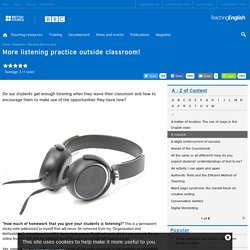
This is a permanent sticky note addressed to myself that will never be removed from my “Organisation and Methodology” virtual board in MIRO, formerly known as Realtimeboard, which I use not only for my online lessons, but also for keeping myself focused on certain job-related issues. Yes, some time ago I used to notice that most of the tasks assigned to the students as homework were all sorts of exercises, reading and writing, and that most listening actually happened only in the lesson.
I was horrified at the discovery because communication in real life very often (not always though, I must admit) occurs when people can hear each other and can respond to what they hear, so the regularity of listening practice must not be underrated. This is how I decided to fix the problem: Learn English and listen to English with podcasts in English. Listening: Top down and bottom up. Top-down vs. bottom-up listeningIn the classroomTop-down listening activitiesBottom-up listening activitiesConclusion Top-down vs. bottom-up listeningImagine the following situations: Over lunch, your friend tells you a story about a recent holiday, which was a disaster.
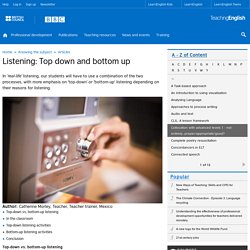
You listen with interest and interject at appropriate moments, maybe to express surprise or sympathy. Ten activities to practise listening fluency in the English classroom. Kasia Piotrowska, winner of the British Council's TeachingEnglish blog award, has collected her favourite listening tasks, games and online resources.
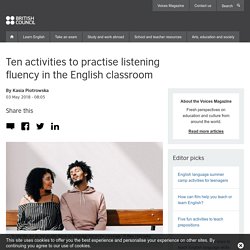
More than half of the time we spend communicating is devoted to listening, according to Chris Battel and his book Effective Listening (ASTD Press, 2006). That makes listening one of the most important language skills to master. My learners often say that it is challenging for them to follow news, songs, or TV series in English. This is because of the speed of speech, unfamiliar accents, the length of the listening text, or unfamiliar vocabulary. (78) Stephen Fry - What Makes Us Human (BBC Radio 2) Dylan Marron: Empathy is not endorsement. Five essential listening skills for English learners. How can learners improve their listening comprehension? Teacher Raphael Ahmed shares some useful strategies in one of our top five articles of all time, illustrated by artist Jamie Johnson. Why listening is important It should not be difficult to realise the importance of listening when we consider that it occupies about 45 per cent of the time adults spend in communication.
This is significantly more than speaking, which accounts for 30 per cent, and reading and writing, which make up 16 per cent and nine per cent respectively. Yet, for all its importance, students (and even teachers) often fail to give listening the attention it needs. What's The Perfect Relationship? Delayed dictation. What is “delayed dictation”?
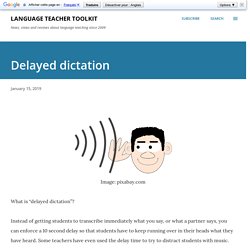
Instead of getting students to transcribe immediately what you say, or what a partner says, you can enforce a 10 second delay so that students have to keep running over in their heads what they have heard. Some teachers have even used the delay time to try to distract students with music. It’s an added challenge for students but has significant value, I think. It reminds me of a phenomenon in music called audiation. Australien med Simon Reeve: Från Darwin till Stora Barriärrevet. A tour of the British Isles in accents. Weird History - Your Twin Might Live Inside You. Scamming a Gumtree Scammer I Joe Lycett. Richard Branson says everyone should watch this kid's TED Talk. Dave Fagan – Interpretative Dance – Bits and Pieces. Sound map - Accents & dialects. Sally Kohn: What we can do about the culture of hate.
Active Listening: Using Times Videos, Podcasts and Articles to Practice a Key Skill. Listening is a skill that we’re in danger of losing in a world of digital distraction and information overload, writes Seth S. Horowitz in “The Science and Art of Listening.” He continues: And yet we dare not lose it. Because listening tunes our brain to the patterns of our environment faster than any other sense, and paying attention to the nonvisual parts of our world feeds into everything from our intellectual sharpness to our dance skills.… “You never listen” is not just the complaint of a problematic relationship, it has also become an epidemic in a world that is exchanging convenience for content, speed for meaning. The richness of life doesn’t lie in the loudness and the beat, but in the timbres and the variations that you can discern if you simply pay attention.
Research shows that being a good listener can make you more influential and a better leader. How much emphasis do you put on the skill of listening in your classroom? “The Daily” Meet the woman who tamed lightning - BBC Ideas. Famous people who may never have existed. You know the story of David and Goliath.

It turns out David wasn't just a one-sling wonder, as he grew up to become King David, a pretty big deal in the Bible. But it's possible that King David wasn't real, meaning he didn't take down a giant with a single rock, a huge blow to underdogs everywhere. According to King David: A Biography by Steven McKenzie (via the New York Times), a 1997 issue of the Chronicle of Higher Education explained that, outside of the Bible, nobody talks about King David. As P. Kyle McCarter, a scholar quoted in the Chronicle, put it, "No ancient inscription mentions him. Of course, there's no guarantee they're speaking of THE King David. 7 Things We Don't Know About the Ocean. Are You A Good Listener? Being a good listener is an essential skill that all people could probably work on.

Teaching Weak Forms - Perfect Pronunciation. Proof of Evolution That You Can Find on Your Body. 10 Best Free Listening Websites with Quizzes to Practise for Listening Exams. So what do you do to practise listening for exams?

Growing up, I never had the opportunity to do any extra practice to improve my listening skills. We didn’t have the Internet and the thousand possibilities it offers to learners of any language nowadays. The teachers had an old tape player that sometimes stopped and started on its own and old tapes that ended up sounding distorted and most of the times unlistenable so if you wanted to get better at listening, you just listened to the radio and struggled to understand the lyrics and sing along. Not that I ever complained. 14 podcasts to improve your listening skills and English vocabulary. Autonomous listening skill development: activity 1 – Lizzie Pinard. Listen!

(Image taken from via Google search for images licensed for commercial reuse with modification) I encourage learners to listen extensively outside class, and extensive listening is recognised as beneficial to language learning. But what about actually developing listening skills? As in, listening with a view to improving both decoding (“translating the speech signal into speech sounds, words and clauses, and finally into a literal meaning” (Field, 2008:kindle loc. 2386)) and meaning-building (“adding to the bare meaning provided by decoding and relating it to what has been said before” (ibid)) skills.
Recipes for the EFL Classroom. Not sure what to do with a listening text coming up soon in the unit?
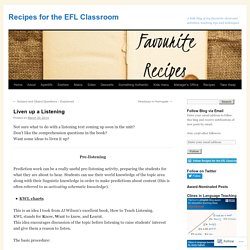
Don’t like the comprehension questions in the book? Want some ideas to liven it up? Pre-listening Prediction work can be a really useful pre-listening activity, preparing the students for what they are about to hear. Students can use their world knowledge of the topic area along with their linguistic knowledge in order to make predictions about content (this is often referred to as activating schematic knowledge). KWL charts. Lessons Worth Sharing. Listening. TED-Ed - Can shipwrecks come back for revenge? Let's... Eleven intervention strategies for underachieving L2-listeners. (Co-authored with Dylan Vinales of Garden International School) 0.Introduction. Five essential listening skills for English learners. Ken Rutkowski - Tim Minchin give an amazing graduation...
The 10 Best Places to Find ELT Listening Materials – Teach them English. This domain name may be for sale. Please click here to inquire. teachthemenglish.com. Great Listening Energizers: Part 1 – Teach them English. Have you ever found yourself at the end of class with a little extra time left over? How about those times when you’ve overestimated how long your planned lesson will take? Don’t worry about it too much; it really does happen to the best of us. What you want up your sleeve is a series of activities that you can exploit as and when you need them; you need tried and tested ways to fill the time up with simple activities that’ll advance your learners in a meaningful way despite the time restriction. A framework for planning a listening skills lesson. In this article I intend to outline a framework that can be used to design a listening lesson that will develop your students' listening skills and look at some of the issues involved.
The basic frameworkPre-listeningWhile listeningPost-listeningApplying the framework to a songSome conclusions The basic framework The basic framework on which you can construct a listening lesson can be divided into three main stages. Pre-listening, during which we help our students prepare to listen.While listening, during which we help to focus their attention on the listening text and guide the development of their understanding of it.Post-listening, during which we help our students integrate what they have learnt from the text into their existing knowledge. Pre-listening There are certain goals that should be achieved before students attempt to listen to any text. These are motivation, contextualisation, and preparation.